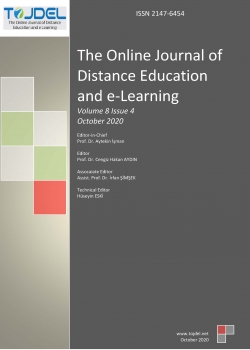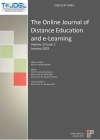TOJDEL - Volume 8 - Issue 4 - October 2020
 ENTANGLEMENTS OF POSTHUMANIST BILDUNG IN VIRTUAL LEARNING ENVIRONMENTS 174
ENTANGLEMENTS OF POSTHUMANIST BILDUNG IN VIRTUAL LEARNING ENVIRONMENTS 174 Charlotta Hilli, Christa Tigerstedt
Abstract:
This study investigates processes of Bildung in the entanglements of space, time, and student collaboration in a Virtual Learning Environment, itslearning. It is a novel approach as the theoretical framework of posthumanist Bildung was introduced in 2017 by Carol Taylor. The data was read with theories on posthumanist Bildung during the diffractive analysis to understand differences in the entanglements between human agents (participants) and non-human agents (deadlines, delayed communication, course content, online posts). The questions pursued are as follows: In what ways are space, time, and student collaboration entangled in the Virtual Learning Environment? What effects do these entanglements produce in the material-discursive practices during the course? Data are reflections by 62 participants in an online course in a Finnish university of applied sciences (2018). The implications of the study are that collaboration in Virtual Learning Environments can involve many entanglements (e.g., cognitive/emotional, theoretical/practical, personal/professional) that matter and are meaningful to the participants because these entanglements are produced in relation to other people and to the time and technologies available.
 LOCKDOWN AREA OF COVID-19: HOW DOES CARTOON BASED E-CONTENTS EFFECT ON LEARNING PERFORMANCE OF INDIAN ELEMENTARY SCHOOL STUDENTS WITH ADHD
LOCKDOWN AREA OF COVID-19: HOW DOES CARTOON BASED E-CONTENTS EFFECT ON LEARNING PERFORMANCE OF INDIAN ELEMENTARY SCHOOL STUDENTS WITH ADHD Ananta Kumar Jena, Jaishree Devi
Abstract:
In the context of the lockdown area of COVID-19, animated and gag cartoon-based intervention has a significant role in promoting students' learning performance at elementary levels. ICT-based intervention on students with ADHD mostly uses in UK, USA, Greece, Iran, and Poland. Still, recent researches are conducting in India, especially in the Northeastern region, to assess its effectiveness. Based on the literature and research questions, the current study aimed to evaluate the effect of animated and gag cartoon-based e-contents intervention on experimental groups' learning performance with those in the comparison group in Silchar town, Assam. 90 students with ADHD were assigned to experimental groups and a comparison group. The experimental group I (n=30, age ranged 10.5-11.5 SD= 11) was exposed to animated cartoon based e-contents instruction, and experimental group II (n=30, age ranged 10.5-11.5 SD= 11) was assigned to gag cartoon based e-contents in Environmental studies. Simultaneously, the traditional approach was used in the comparison group (n=30, age ranged 10.5-11.5 SD= 11). The quasi-experimental design was used to examine the effect of animated and gag cartoon-based e-contents intervention on experimental groups' learning performance with those in the comparison group. It resulted in animated cartoon-based e-contents and gag cartoon-based e-content intervention that significantly affected participants' performance over the comparison group.
 ONLINE TEACHING-LEARNING DURING COVID-19 PANDEMIC: STUDENTS’ PERSPECTIVE
ONLINE TEACHING-LEARNING DURING COVID-19 PANDEMIC: STUDENTS’ PERSPECTIVE Naziya Hasan, Naved Hassan Khan
Abstract:
Considering the sudden shift to online teaching due to COVID-19 pandemic, a qualitative survey was conducted on 408 students to uncover their perspectives on online teaching-learning. The data, collected by questionnaire, were analyzed, using percentage and frequency. Results indicated that students were enjoying online learning. Flexibility was found to be the most liked and poor network and connectivity, the most disliked elements of online learning. Adding to it, lack of interaction, distractions and one-sided learning were mentioned as its disadvantages. Online safety and security issues were not addressed and disabled students experienced teachers’ negligence and lack of support.
 ONLINE TUTORING AND COUNSELLING OF DISTANCE LEARNERS: REDEFINING THE ROLE OF REGIONAL CENTRES AND LEARNER SUPPORT CENTRES IN THE DIGITAL AGE
ONLINE TUTORING AND COUNSELLING OF DISTANCE LEARNERS: REDEFINING THE ROLE OF REGIONAL CENTRES AND LEARNER SUPPORT CENTRES IN THE DIGITAL AGE Manjulika Srivastava, SK Pulist, Navita Abrol, Shekhar Suman
Abstract:
Counselling and tutoring are the backbone of any educational system whether Conventional or Open and
Distance Learning (ODL), and this present scenario of social distancing has brought both the pattern of
education on a single platform- Online mode. While the conventional system is struggling to find suitable ways
of providing education without losing the ethos, ODL institutions are having the upper hand in dealing with
these exceptional circumstances due to their inbuilt, inescapable requirement of using various technologies for
the delivery of instruction and supporting their distance learners.
The pandemic of the coronavirus (COVID-19) has been a catalyst in speeding up the shift from face-to-face to
online methods of tutoring and counselling distance learners. All Open Universities (OUs) and Directorates of
Distance Education (DDEs) have to rethink their operations including redefining the roles and functions of their
Regional Centres(RCs) and Learner Support Centres(LSCs), as brick and mortar institutions alone are not
sufficient to provide counselling and tutoring support to distance learners in the times ahead.
This paper outlines the various online methods available for ODL institutions to switch over to, for providing
effective counselling and tutoring support to their distance learners. An attempt has been made to identify the
available technologies; define their characteristics: synchronous/asynchronous, number of learners it can serve,
interactivity, etc.; and prepare a matrix on their utilization for different levels and types of tutoring and
counselling. The new model that is being proposed will require re-designing the learner support system as such.
In this context, the role of Regional Centres (RCs) and Learner Support Centres (LSCs) will need to be
redefined. Also, the role of existing academic counsellors will need to be recast.
All the changes proposed by the researchers will completely overhaul the existing ODL system and facilitate the
ODL institutions to respond to the need of the hour and make the learners well versed with the skills required for
the 21st century.
 THE NEW AGE DISTANCE EDUCATION LEARNERS – EMERGING TRENDS
THE NEW AGE DISTANCE EDUCATION LEARNERS – EMERGING TRENDS L. SENTHILKUMAR
Abstract:
In a Higher Education Institution, Student Affairs department plays an integral role for the smooth functioning of the institute. A student when in need of any information or for any of his queries or for grievance redressal, first approaches this Student Support Service department. The efficiency and the effectiveness of this unit in addressing the student’s queries and their requirements, facilitate in harnessing the student’s effort towards the core academic activity. The paper attempts to unravel the different needs of the students at different stages of the student life cycle, the student services which are to be made available by the higher education institution at those appropriate times, the relevant information which are to be shared with the students prior and assess its impact on their learning progress. This study was conducted in a higher education institution which offered distance education program. A distance education student for any of their requirements first approaches the student service department only then if needed he connects with his academic department. It is seen that an immediate query redressal by the department facilitates in enhancing the learner experience. And this greater level of engagement has resulted in an improved student retention.
 TOWARDS INVESTIGATION OF ISSUES AND CHALLENGES IN FACULTY TRANSITIONS TO ONLINE INSTRUCTIONAL ENVIRONMENT AMIDST COVID-19: A QUALITATIVE STUDY
TOWARDS INVESTIGATION OF ISSUES AND CHALLENGES IN FACULTY TRANSITIONS TO ONLINE INSTRUCTIONAL ENVIRONMENT AMIDST COVID-19: A QUALITATIVE STUDY Jyoti Joshi
Abstract:
The world has embarked upon a golden age of technology. In education, as in every other sphere of life, technology plays an important role. Unlike other countries, the use of technology in the Indian education system has been rudimentary, but the closure of universities and colleges to check the spread of malicious COVID-19 has catapulted the virtual learning into the spotlight in India. The present paper aims to investigate the challenges that higher education faculty experienced while transitioning from an offline teaching environment to an online instructional environment during the lockdown. A qualitative study was carried out with 20 faculty members teaching in higher educational institutions. Telephonic interviews were conducted to collect the data. Based on the data analysis, six challenges are identified and lastly few feasible solutions are being proposed to deal with them.


